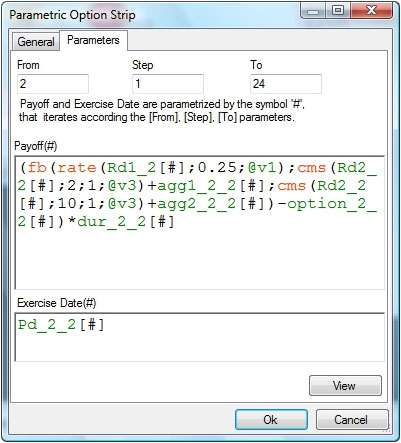Log in
Signup
Signup
Fairmat allows the user to choose the best description of the dynamic evolution of the valuation drivers from a set of different models. Moreover, with Fairmat you can design any financial project using a graphic representation combined with a high level algebraic language.
In order to price structures with conditional/compound payments, decisions that switch among different modes, or simply options that can be exercised ahead of their maturity, an optimal policy must be computed which usually requires case-specific coding. Fairmat's graphic/algebraic language enables users to save hours (and even days) of code writing and testing, so as to focus solely on the specific features of the financial project.

Complex payoffs occurring in exotic contracts or in the valuation of real options can be expressed easily with a flexible built-in algebraic language.

Fairmat calculates the fair value of a financial project using a range of numerical methods – from simple ones like binomial lattices, to more sophisticated approaches like Least-Squares Monte Carlo simulation. In addition to this, optimal execution policies, the distribution of future cash flows, and various risk assessments can be obtained as by-products of the valuation.
Fairmat is available in an academic version that can be downloaded and used on many different OS platforms free of charge. Anyone interested in studying or doing research on financial problems can use it. Moreover, if you would like to contribute to the development of the software, you can create open source implementations of new features as “plug-ins”. Only commercial versions of the software requires the payment of a license fee.
Contracts and projects implemented with Fairmat can be easily assessed, checked and compared with other users and software programs. This is because the whole description of the contract can be saved within a single model-file.
We believe in open source software. No development team, whatever its size, can be as effective as an entire community of users/developers. However, one the limits of the standard open source business model is that frequently the value generated by the common effort made is retained by the original contributors, or – in the worst case – by free-riders who exploit the effort without paying back the community. We believe that, being a community effort, the value of the project must be shared with those who create it. We believe on the need to reward the time a community spends on improving on-line projects. While the software’s core is closed in order make sure that the project's outcomes are shared among creators and contributors, this project is owned by the community. For that reason, if outcomes are generated, they will be shared with the community through a revenue sharing agreement with developers/contributors. We believe that this approach is revolutionary, especially for financial software.
We are setting up a free repository where developers can upload and share open-source applications (“plug-ins”). We invite users to create and publish innovative contributions in any area of financial economics. This would permit other users to test and review the contributions. Every six months (see the road map) the best plug-ins (tested and organized) will be packed into an official open-source collection available free of charge. This process is driven by the community itself. Finally, let us hear your suggestions on how to improve all the aspects of this project, including revenue-sharing agreements and development aspects.
The Fairmat team.